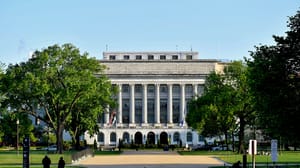Judge reinstates WOTUS rule in 26 states
Updated: Farm Bureau asks court to stay its ruling.
August 21, 2018

Updated 8/21/18
The American Farm Bureau Federation and a broad coalition of industry groups on Monday asked the U.S. District Court of South Carolina to stay its order striking a rule that delayed implementation of the 2015 Waters of the U.S. rule.
According to Monday’s Farm Bureau filing, the court’s decision to strike the delay rule harms the public interest “because the 2015 WOTUS rule was promulgated in violation of [procedural requirements], is inconsistent with the text of the [Clean Water Act], and is unconstitutional—as every court to consider the issue has concluded.”
“Enormously consequential national regulations like the WOTUS rule—which subject commonplace activities involved in building, farming, and pest management to a complex and burdensome federal permitting and enforcement scheme—should not apply differently depending on whether the activity happens to be located on one side of a state line or the other," AFBF said in a statement.
The ruling
The U.S. District Court in South Carolina ruled against the Trump administration Thursday (Aug. 16) for delaying the Obama-era Waters of the United States rule, the Washington Examiner reported. The decision means the rule is operative again in 26 states where district courts haven’t halted the regulation.
The decision stems from a suit filed by the Southern Environmental Law Center in the U.S. District Court located in Charleston.
The ruling ends the Environmental Protection Agency and U.S. Army Corps of Engineers’ suspension of clean water protections under the Clean Water Act. The ruling does not apply to 24 states where other legal challenges are pending.
“This is a victory for families and communities across America who depend on clean water, and a rebuke to the polluting industries trying to gut this nation’s bedrock health and environmental safeguards,” said Senior Attorney Geoff Gisler, who is representing the coalition of conservation groups before the court. “We are thrilled the court rejected this administration’s blatant attempts to undermine safeguards that are critical to our nation’s welfare without being accountable to the American people.”
The Southern Environmental Law Center filed the initial challenge in February on behalf of American Rivers, Clean Water Action, Defenders of Wildlife, Charleston Waterkeeper, Chattahoochee Riverkeeper, Coastal Conservation League, Friends of the Rappahannock, North Carolina Coastal Federation, and North Carolina Wildlife Federation.
The lawsuit alleged EPA and the U.S. Army Corps of Engineers violated fundamental laws prohibiting agencies from removing basis environmental safeguards without telling the public what they are doing, revealing the impact of those changes and giving the public a chane to weigh in.
The court held that the agencies refusal to allow meaningful public comment doomed the rule, stating that “An illusory opportunity to comment is no opportunity at all.”
Finalized after 200 days of public comment and review of 1,200 studies, the Southern Environmental Law Center says the Clean Water Rule used science to draw clear lines about what American waters are protected from pollution by the Clean Water Act.
The American Farm Bureau Federation has a completely different take, calling the ruling “misguided” and the WOTUS rule itself “overbroad, vague and illegal.”
““To avoid widespread uncertainty and potential enforcement against ordinary farming activities in these already-uncertain times, we call on the administration to take immediate steps to limit the impact of this dangerous court decision,” said AFBF President Zippy Duvall. “The U.S. District Court for South Carolina was wrong to invalidate the agency’s ‘applicability rule’ that had simply delayed the effective date of the 2015 WOTUS rule. The delay rule would have maintained regulatory certainty and stability while the administration completes its reconsideration of the 2015 rule and works to develop a new regulation to provide both clean water and clear rules. Today’s court ruling creates enormous regulatory uncertainty and risk for farmers, ranchers and others in the 26 states that are not already protected from the unlawful 2015 rule by previous court decisions.”
Duvall urged the administration to immediately take action to limit the scope of the ruling to South Carolina while working to repeal the 2015 rule.
About the Author(s)
You May Also Like



